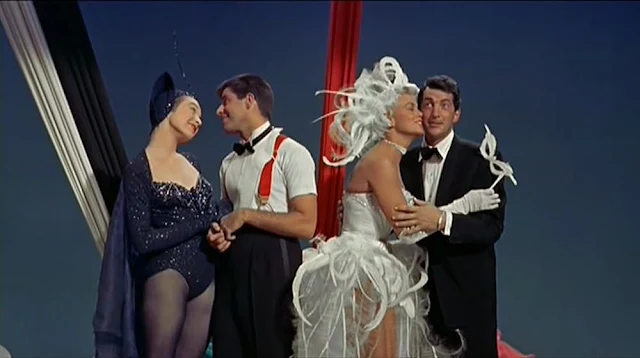I could never countenance plagiarism, but as they say, if you're going to steal, steal from the best. Even if you're Howard Hawks stealing from Howard Hawks, which happens almost shamelessly in
Rio Bravo. No one who loves Hawks's
Red River (1948) as much as I do could fail to miss how much of
Rio Bravo is, let us say, borrowed from that film. There's the byplay between Sheriff John T. Chance (John Wayne) and Stumpy (Walter Brennan), which echoes that of Dunson (Wayne) and Groot (Brennan) in
Red River. Ricky Nelson's young gun Colorado Ryan is a reworking of Montgomery Clift's Matthew Garth. And Angie Dickinson's Feathers could almost be a parody of Joanne Dru's motormouth Tess Millay. But the Hawksian borrowings don't stop with
Red River. When Feathers kisses Chance for the first time and then goes in for a second kiss in which he participates more enthusiastically, she comments, "It's better when two people do it," which is a direct steal from a similar scene in
To Have and Have Not (Hawks, 1944) when "Slim" (Lauren Bacall) tells "Steve" (Humphrey Bogart), "It's even better when you help." The two movies share not only a director but also a screenwriter, Jules Furthman, who is joined in
Rio Bravo by Leigh Brackett, who earlier worked together on another Bogart-Bacall-Hawks movie,
The Big Sleep (1946). Even the composer of the score for
Rio Bravo, Dimitri Tiomkin, gets into the borrowing game, taking a theme from his score for
Red River and handing it over to lyricist Paul Francis Webster for the song, "My Rifle, My Pony, and Me," sung by Dean Martin's Dude and Nelson's Colorado.
Rio Bravo isn't as great a movie as
Red River by a long shot, and it probably signals some creative exhaustion on Hawks's part that he not only borrowed so heavily from his earlier work but also felt it necessary to remake
Rio Bravo in two thinly disguised versions also starring Wayne, as
El Dorado (1966) and
Rio Lobo (1970). But is there a more entertaining self-plagiarism, and a surer demonstration of what made Hawks one of the great filmmakers?


















